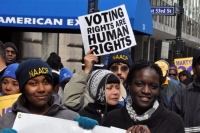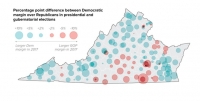Ricks has spent the past month on the streets, but this past week, when on Friday temperatures in the city fell to a record of low of -16.5C, has been his toughest so far.
“To your bone you’re cold,” Hicks said, stood outside the Bowery Mission in lower Manhattan, where he has been sleeping for the past few weeks, “I’ve never experienced this, and I’m a New Yorker. When it was cold, I used to be able to go inside.”
Ricks is one of an estimated 58,284 homeless people in New York City, according to the most recent statistics from New York’s department for homeless services, who are amongst the most vulnerable as the polar vortex grips the north-east US. Advocates estimate that the number is slightly higher at just over 60,000, making it the largest number of homeless people ever recorded in New York.
New York mayor Bill de Blasio has made combating homelessness one of his administration’s top priorities, pledging to eradicate homelessness amongst veterans by the end of the year and create 80,000 new affordable housing units within a decade.
But a few blocks away at the New York City Rescue Mission, David Chicaguala, the shelter’s chief operating officer, is preparing for a further influx of guests. On Thursday night the shelter was at almost double capacity – 140 people - as the city called a “Code Blue”, meaning shelters were instructed to keep their premises open all day and admit everyone in need, even if that meant going over capacity.
Sleeping mats are laid out on the floor of the chapel, chairs line the corridors. Chicaguala expected another Code Blue on Friday. One has been called every night this week.
“It might not be the most comfortable thing, but they’re out of the elements,” said Chicaguala, keen to emphasise that the shelter is always at capacity, even when temperatures are not as extreme.
The mission expects to serve 400 meals a day over the weekend.
“This is the worst I’ve seen,” said Jose Peguero, who has been staying in the shelter for three weeks. Peguero, 61, lost his job as a car salesman in the recession and became homeless three years ago.
“I like this place,” he said of the shelter. “You come to sleep, to have your meals and all that. At least it’s something that helps.”
Once a Code Blue is called in the city, the department of homeless services doubles its outreach staff. They are tasked with finding those in need of help, traveling the subways or walking the streets to deliver them to shelter for the night.
The homeless population has increased in other major cities in the north-east, the region hardest hit by the extreme weather of the polar vortex.
In Boston, advocates estimate around 30% more people are homeless this winter than last. There too, authorities have scrambled as record snowfall and freezing temperatures have engulfed the city for weeks.
The closure of the city’s largest shelter, in October last year, and a crackdown on sleeping in certain public areas has made that job tougher and led to further overcrowding of shelters, advocates told local public radio earlier this week.
Back at the Bowery, Kenneth Ricks is contemplating another night at the overcrowded shelter, where he sleeps on the floor.
“You can’t even roll over, the mats aren’t even twin sized,” he said, taking a last puff of a cigarette and heading back inside to the warmth. “I just came from major surgery, and I’m constantly worried about that because any trauma through this weather could lead to me losing my leg and a lot of other things.”
Link to original article from The Guardian


 Imagine going to the polls on Election Day and discovering that your ballot could be collected and reviewed by the
Imagine going to the polls on Election Day and discovering that your ballot could be collected and reviewed by the ACLU Blueprints Offer Vision to Cut US Incarceration Rate in Half by Prioritizing 'People Over Prisons'
ACLU Blueprints Offer Vision to Cut US Incarceration Rate in Half by Prioritizing 'People Over Prisons'  "These disasters drag into the light exactly who is already being thrown away," notes Naomi Klein
"These disasters drag into the light exactly who is already being thrown away," notes Naomi Klein  How about some good news? Kansas Democratic Representative advances bill for Native Peoples.
How about some good news? Kansas Democratic Representative advances bill for Native Peoples.  What mattered was that he showed up — that he put himself in front of the people whose opinions on
What mattered was that he showed up — that he put himself in front of the people whose opinions on On a night of Democratic victories, one of the most significant wins came in Virginia, where the party held onto
On a night of Democratic victories, one of the most significant wins came in Virginia, where the party held onto A seismic political battle that could send shockwaves all the way to the White House was launched last week in
A seismic political battle that could send shockwaves all the way to the White House was launched last week in In an interview with Reuters conducted a month after he took office, Donald Trump asserted that the U.S. had “fallen
In an interview with Reuters conducted a month after he took office, Donald Trump asserted that the U.S. had “fallen Attorney General Jeff Sessions overturned the sweeping criminal charging policy of former attorney general Eric H. Holder Jr. and directed
Attorney General Jeff Sessions overturned the sweeping criminal charging policy of former attorney general Eric H. Holder Jr. and directed